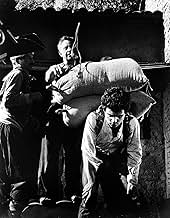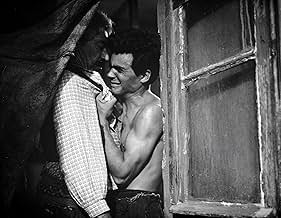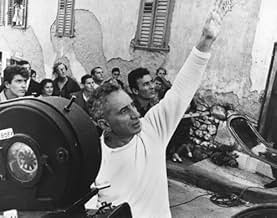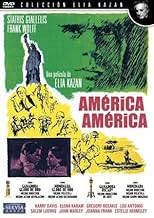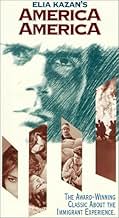IMDb रेटिंग
7.7/10
6.3 हज़ार
आपकी रेटिंग
एक युवा ग्रीक अमेरिका जाने के लिए सुरक्षित मार्ग पर रुकेगा..एक युवा ग्रीक अमेरिका जाने के लिए सुरक्षित मार्ग पर रुकेगा..एक युवा ग्रीक अमेरिका जाने के लिए सुरक्षित मार्ग पर रुकेगा..
- 1 ऑस्कर जीते
- 7 जीत और कुल 12 नामांकन
Garrett Cassell
- Dog Walker
- (बिना क्रेडिट के)
Tom Holland
- Voice Overs
- (वॉइस)
- (बिना क्रेडिट के)
Elia Kazan
- Self
- (वॉइस)
- (बिना क्रेडिट के)
फ़ीचर्ड समीक्षाएं
Imagine a film like "The Godfather" receiving almost no audience, relegated to the occasional appearance on the AMC channel, barely being released on VHS or DVD, and you will have some idea of the tragic fate of this lost epic masterpiece. As hard as it is to believe, this may be the prolific director Elia Kazan's greatest film achievement, yet hardly anyone has seen it. This is a film on the epic scale of "The Godfather," about a young Armenian man's escape from Turkish persecution, flight from Anatolia, and eventual immigration to Ellis Island - all based upon the the experiences of the director's uncle. What is also tragic is the fact that I can think of no other film which portrays the cruel persecution and genocide inflicted upon the Armenian minority by the Ottoman Turks in the early 20th century (which Hitler correctly pointed to as proof that the world would look the other way at the genocide he had planned in Europe in the 1930s). Every period detail in the film is perfect, from the Oscar-winning costume design to the set design, Greek folk music score, veteran Haskell Wexler's cinematography, and acting - especially lead actor Giallelis, whose intensity brings to mind some of Brando's early work.
It is obvious that this film was a very personal piece of film-making for Kazan. And though I don't want to dwell as others do on Kazan's checkered past in his naming of communist colleagues for HUAC in the 1950s, it is interesting to note a parallel in the main character Stavros' personal anguish in making the choice to leave his wealthy wife and use her money to immigrate to the United States; both men made the conscious decision to drive a wedge between them and their past relationships. This is truly a film for all Americans to treasure, and if I had my way, I would make sure it was broadcast every 4th of July just as "It's a Wonderful Life" is broadcast every Christmas. As a nation of immigrants and descendants of immigrants, this is a film virtually every American can relate to. I can't figure out why it is so obscure.
It is obvious that this film was a very personal piece of film-making for Kazan. And though I don't want to dwell as others do on Kazan's checkered past in his naming of communist colleagues for HUAC in the 1950s, it is interesting to note a parallel in the main character Stavros' personal anguish in making the choice to leave his wealthy wife and use her money to immigrate to the United States; both men made the conscious decision to drive a wedge between them and their past relationships. This is truly a film for all Americans to treasure, and if I had my way, I would make sure it was broadcast every 4th of July just as "It's a Wonderful Life" is broadcast every Christmas. As a nation of immigrants and descendants of immigrants, this is a film virtually every American can relate to. I can't figure out why it is so obscure.
"America, America" deserves a modern audience but is almost impossible to find. I just viewed a VHS version obtained through the inter-library loan program. I live in Virginia and it was sent down from Alaska!
This film should be required viewing for anyone interested in understanding why the huddled masses flocked to America but it is highly personalized and focused on a young man from a middle class Greek family with a big dream that seems impossible to fulfill. Another reviewer correctly likened Stathis Giallelis to a young Brando for his overpowering individuality, determination, and (for Turkish society in 1900) swagger. But when his character Stavros grows a mustache, he becomes a young Omar Sharif. AA is brilliantly written and directed by Elia Kazan.
This film should be required viewing for anyone interested in understanding why the huddled masses flocked to America but it is highly personalized and focused on a young man from a middle class Greek family with a big dream that seems impossible to fulfill. Another reviewer correctly likened Stathis Giallelis to a young Brando for his overpowering individuality, determination, and (for Turkish society in 1900) swagger. But when his character Stavros grows a mustache, he becomes a young Omar Sharif. AA is brilliantly written and directed by Elia Kazan.
"America, America" is a movie made with the soul. It is a hair-raising movie about the immigrant experience, made by artists temporarily outside the Hollywood cage. It is about the struggle to be human in a world that bites at you, and it is about naked desire. "America, America" is a film about a young man with ichor in his arteries, made by people with ichor in their arteries.
Stavros is a young Greek from Anatolia, a youth with burning eyes, full of ethos as well. He yearns to live a life away from degradation (Greeks in Anatolia were a despised minority). This movie shows his peregrination to America, in three of the shortest hours I've ever lived. It shows a cycle of being broken and rebuilt over and again, the death of illusions, the obduracy of hope, and the rack of desire.
Haskell Wexler deserves special mention as he quite frequently produced jaw-dropping shots in this movie. There is a scene in this movie where Stavros is sat next to an older woman, Sophia (sat together like panthers watching an ape play with jackals), and the electricity between them, established entirely visually, is a devastation.
The editing from Dede Allen, is similarly special, and you can see that Kazan acknowledged all this creative talent as he reads out all the names of the major creative staff at the end over the credits. One particularly beautiful effect was a dissolve the last time we see Stavros' mother, where her face persist on the screen for a moment, almost as if she has become a ghost.
You absolutely must see this movie.
Stavros is a young Greek from Anatolia, a youth with burning eyes, full of ethos as well. He yearns to live a life away from degradation (Greeks in Anatolia were a despised minority). This movie shows his peregrination to America, in three of the shortest hours I've ever lived. It shows a cycle of being broken and rebuilt over and again, the death of illusions, the obduracy of hope, and the rack of desire.
Haskell Wexler deserves special mention as he quite frequently produced jaw-dropping shots in this movie. There is a scene in this movie where Stavros is sat next to an older woman, Sophia (sat together like panthers watching an ape play with jackals), and the electricity between them, established entirely visually, is a devastation.
The editing from Dede Allen, is similarly special, and you can see that Kazan acknowledged all this creative talent as he reads out all the names of the major creative staff at the end over the credits. One particularly beautiful effect was a dissolve the last time we see Stavros' mother, where her face persist on the screen for a moment, almost as if she has become a ghost.
You absolutely must see this movie.
While I am not sure I'd consider this to be Elia Kazan's best film, it certainly ranks up there with his best--which is saying a lot considering he's the same guy who brought us "On The Waterfront", "A Streetcar Named Desire" and "Rebel Without a Cause". As for Kazan himself, this was his favorite film as it's the story of his uncle--a man who busted his butt to get himself to America around the turn of the century.
When the movie begins, Kazan himself narrates and explains that the story is about the man who is responsible for him and his family immigrating to the US. His story begins in Turkey. It's around the time in history when the Turks were about to wipe out most of the Armenians--and things for other minorities in their land (in this case, the Greeks) weren't very good either. So, a family decides to send their oldest son, Stavros (Stathis Giallelis), to Constantiople to earn his fortune--and to be able to afford to eventually bring them all to America...and freedom. Stavros is a very, very determined man...but also quite naive. Again and again, he's used by people and left with nothing. But, he's an amazingly resilient guy and soon he's willing to do just about anything to make the money he needs to take the ship to America.
While the story is rather simple, it's handled exquisitely. You can really tell that it's a labor of love, as the story unfolds very slowly and patiently. This is NOT a complaint-just a statement about the writer/director's style in the movie. It's really great what he was able to achieve with mostly inexperienced actors and non-actors. Perhaps Giallelis' performance is a bit too quiet and even stilted...but it is hard to imagine that he wasn't even an actor! Overall, it's a beautiful tale--and one of the most American of movies because it tells a story of immigration that most of us in the US can relate to. Even though my family was not Greek, so much of the rest of the film is pretty typical of what other poor families like my own probably went through on their way to a new land. Well worth seeing and a nice history lesson.
When the movie begins, Kazan himself narrates and explains that the story is about the man who is responsible for him and his family immigrating to the US. His story begins in Turkey. It's around the time in history when the Turks were about to wipe out most of the Armenians--and things for other minorities in their land (in this case, the Greeks) weren't very good either. So, a family decides to send their oldest son, Stavros (Stathis Giallelis), to Constantiople to earn his fortune--and to be able to afford to eventually bring them all to America...and freedom. Stavros is a very, very determined man...but also quite naive. Again and again, he's used by people and left with nothing. But, he's an amazingly resilient guy and soon he's willing to do just about anything to make the money he needs to take the ship to America.
While the story is rather simple, it's handled exquisitely. You can really tell that it's a labor of love, as the story unfolds very slowly and patiently. This is NOT a complaint-just a statement about the writer/director's style in the movie. It's really great what he was able to achieve with mostly inexperienced actors and non-actors. Perhaps Giallelis' performance is a bit too quiet and even stilted...but it is hard to imagine that he wasn't even an actor! Overall, it's a beautiful tale--and one of the most American of movies because it tells a story of immigration that most of us in the US can relate to. Even though my family was not Greek, so much of the rest of the film is pretty typical of what other poor families like my own probably went through on their way to a new land. Well worth seeing and a nice history lesson.
I first saw America, America when it was originally released and I saw it with my father. When the lights came up, I looked at my father and there were tears in his eyes and he said "this is my story too". His journey to America was the same as the character in the movie, only he came from Armenia.
Elia Kazan, with this movie has told the story of many immigrants, just like my father, with truth and depth of character. This isn't a fairy tale, the story is real and reflects the perils and experiences many immigrants took to come to
America. I am amazed that more people don't know about this movie. Whenever I rewatch it, I am reminded of the sacrifices my father made to come to this country and why I'm am blessed to be an American.
Elia Kazan, with this movie has told the story of many immigrants, just like my father, with truth and depth of character. This isn't a fairy tale, the story is real and reflects the perils and experiences many immigrants took to come to
America. I am amazed that more people don't know about this movie. Whenever I rewatch it, I am reminded of the sacrifices my father made to come to this country and why I'm am blessed to be an American.
क्या आपको पता है
- ट्रिवियाOf all the films he had directed, this one was Elia Kazan's favorite film, as it was very personal to him.
- गूफ़An old woman is humming a tune from Astor Piazzolla's Libertango in the 1900s, decades before the composer was even born.
- भाव
Elia Kazan: [Voice- over] My name is Elia Kazan. I am a Greek by blood, a Turk by birth and an American because my uncle made a journey.
- क्रेज़ी क्रेडिटDirector Elia Kazan narrates the main portion of the closing credits, reading the words as they appear on the screen, using complete sentences such as "The cinematography was by Haskell Wexler."
- कनेक्शनEdited into Grand format: Amérique, notre histoire (2006)
- साउंडट्रैकExcitement In The Village
टॉप पसंद
रेटिंग देने के लिए साइन-इन करें और वैयक्तिकृत सुझावों के लिए वॉचलिस्ट करें
- How long is America America?Alexa द्वारा संचालित
विवरण
- चलने की अवधि2 घंटे 54 मिनट
- रंग
- पक्ष अनुपात
- 1.85 : 1
इस पेज में योगदान दें
किसी बदलाव का सुझाव दें या अनुपलब्ध कॉन्टेंट जोड़ें








